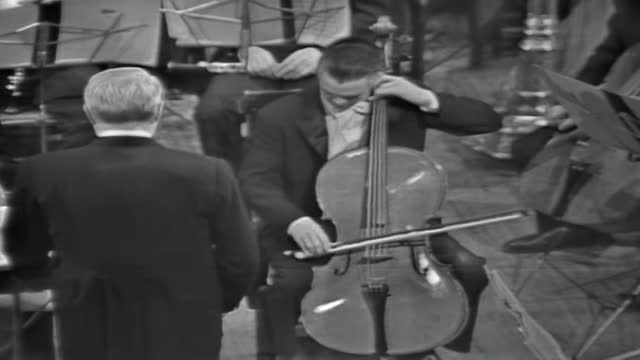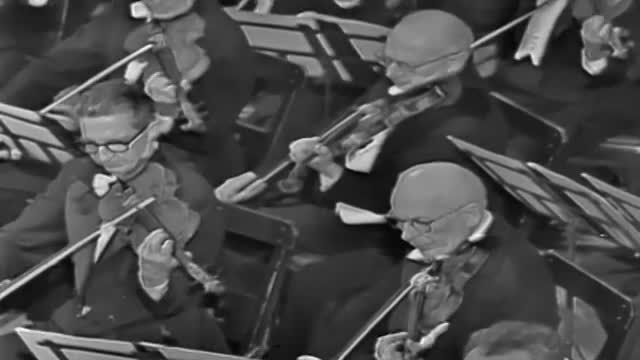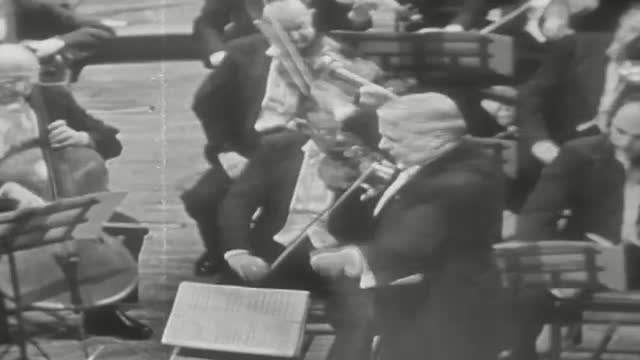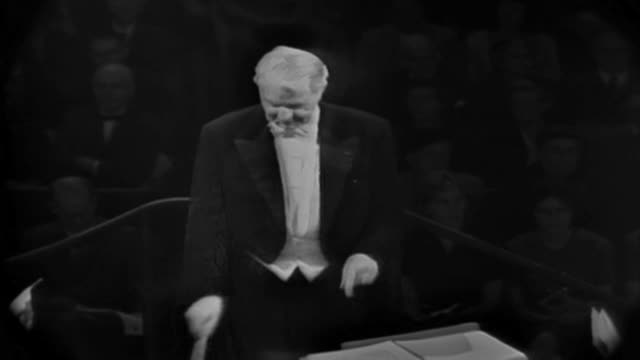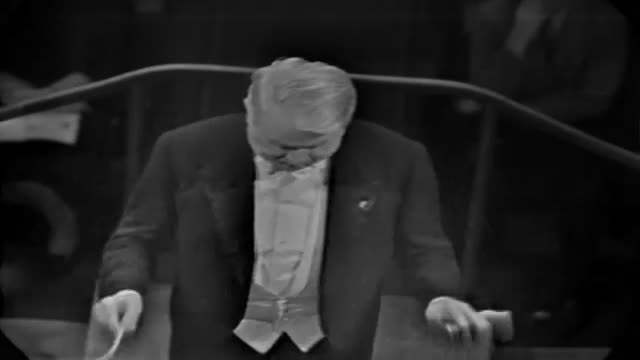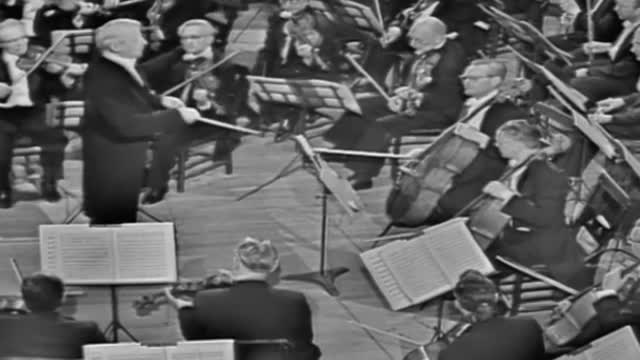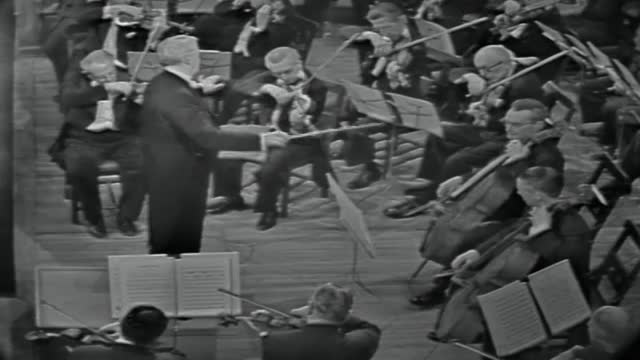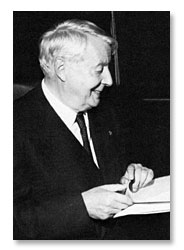
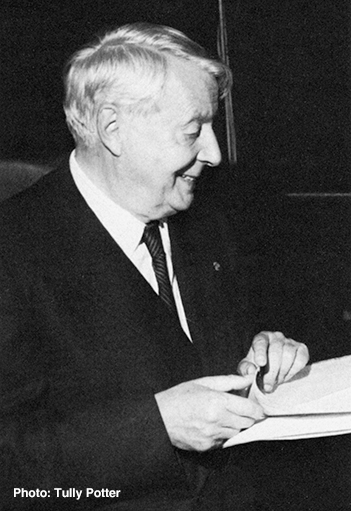
Charles Munch’s uncle was the distinguished missionary and organist Albert Schweitzer, and his father was the Alsatian choral conductor and organist Ernst Münch (1859–1928), who gave his son his first music lessons on the violin. Charles studied the violin at the Strasbourg Conservatoire, where his father was a professor, and continued with Lucien Capet in Paris in 1912 and Carl Flesch in Berlin. As Alsace was part of Germany at the outbreak of World War I, he was conscripted into the German army and saw active service: he was made a sergeant of artillery, was gassed at Peronne and wounded at Verdun. Following the end of hostilities he returned to Alsace-Lorraine (now part of France), and took French citizenship. Munch became a professor of violin at the Strasbourg Conservatoire in 1919 and leader of the Strasbourg Municipal Orchestra. He took up the same position at the Leipzig Conservatory in 1925, serving also as the leader of the Leipzig Gewandhaus Orchestra, whose conductors during this period included Fritz Busch, Wilhelm Furtwängler and Bruno Walter. It was in Leipzig that he had his first experience of conducting.
Having returned to France in 1932, Munch made his Paris debut as a conductor in a self-financed concert (which he later said he had not been able to fund earlier) with the Straram Orchestra. This was sufficiently successful to confirm his decision to pursue a career as a conductor and in 1935 he became chief conductor of the newly-formed Paris Philharmonic Orchestra which he conducted until 1938. Meanwhile he continued to teach the violin, being made a professor of violin at the École Normale in 1936. He was invited to conduct at the 1937 meeting of the International Society of Contemporary Music in Berlin and in the following year was appointed chief conductor of Paris’s oldest orchestra, the Paris Conservatoire Orchestra (Orchestre de la Société des Concerts du Conservatoire); he also appeared in London at the head of the BBC Symphony Orchestra and made his American conducting debut in 1939 with the St Louis Symphony Orchestra. With the outbreak of World War II Munch threw himself into his work as conductor of the Paris Conservatoire Orchestra, commenting: ‘My role is to raise spirits to happier worlds.’ During the war he refused to collaborate with the Nazi regime, and gave his earnings to the French Resistance; he was made a member of the Légion d’honneur in 1945.
With the coming of peace Munch’s international career took off rapidly: he appeared in Prague in 1945 at the fiftieth celebrations of the foundation of the Czech Philharmonic Orchestra, and during the following year appeared at the Salzburg Festival with the Vienna Philharmonic Orchestra, toured America with the Orchestre National de Radio France, the principal French radio orchestra, and spent a month in London recording for Decca with the Paris Conservatoire Orchestra. Having relinquished his post with the Paris Conservatoire Orchestra in 1946, he appeared for the first time with the New York Philharmonic Orchestra in 1947 and with the Chicago Symphony Orchestra in 1948; the following year, he succeeded Serge Koussevitzky as chief conductor of the Boston Symphony Orchestra, and in 1952 as director of the Berkshire Music Center at Tanglewood, holding both these posts until 1962. He toured with the Boston Symphony Orchestra across Europe in 1952 and 1956, when it became the first American orchestra to visit the USSR. Munch appeared in Europe sporadically during this period: he conducted the Vienna Philharmonic again at the Salzburg Festival in 1955 and accepted the presidency of the Concerts Colonne from 1956 to 1958. Following his departure from America he conducted little: in 1965 he appeared with the Rotterdam Philharmonic Orchestra and toured the USSR once again, with the Orchestre National de Radio France. Following the decision to disband the Paris Conservatoire Orchestra and to form the Orchestre de Paris in 1967, Munch was persuaded to become the new orchestra’s first chief conductor. During 1968 he toured Russia with the orchestra, but had to cancel several concerts because of ill-health; and in the autumn of the same year, during a further tour by the orchestra, this time of the USA, Munch suffered a fatal heart attack.
Coming from the divided territory of Alsace, and with experience as an instrumentalist of both German and French musical cultures, Charles Munch was equally at home in the music of both countries. As a conductor he was the complete opposite of ‘intellectual’ musicians such as Pierre Boulez, being a wholly spontaneous artist, whose performances could capture the instinct of the moment: ‘literally anything could happen when he got up onto the podium.’ He was able to realise whatever he wished as he possessed an exemplary stick technique, and at recording sessions he could adjust issues of balance, phrasing and tempo simply through his gestures without a word to the orchestra. In his autobiography, I am a Conductor, Munch spoke thus of conducting: ‘Your thought, your communication must radiate with such force that your orchestra feel simultaneously the same wishes and desires as you and cannot refrain from expressing them,’ and also: ‘A friend of mine, a musician in the Orchestre de la Suisse Romande, once said to me, “When every member of the orchestra feels that you are conducting for him alone, you are conducting well.” ’ By all accounts a man of great kindness both on and off the podium, Munch certainly achieved the twin goals of conducting: superb technical execution combined with the spontaneity of the moment.
Munch’s discography is large and is centred upon the numerous superbly engineered recordings that he made with the Boston Symphony Orchestra for the RCA label. Beside these may be set his earlier recordings made in Paris and London for the 78rpm medium and his final recordings made predominantly in France. Throughout his career Munch was a staunch advocate of contemporary music: with the Boston Symphony Orchestra he recorded Martinů’s Symphony No. 6 (which he commissioned) and Piston’s Symphony No. 6. As his autobiography clearly demonstrated Munch was a man of considerable eloquence, who viewed conducting as a sacred trust: ‘Music is an art that expresses the inexpressible. It rises far above what words can mean or the intelligence define. Its domain is the imponderable and impalpable land of the unconscious. Man’s right to speak this language is for me the most precious gift that has been bestowed upon us. And we have no right to misuse it…Let no one be astonished then that I consider my work a priesthood, not a profession. It is not too strong a word.’
© Naxos Rights International Ltd. — David Patmore (A–Z of Conductors, Naxos 8.558087–90).
